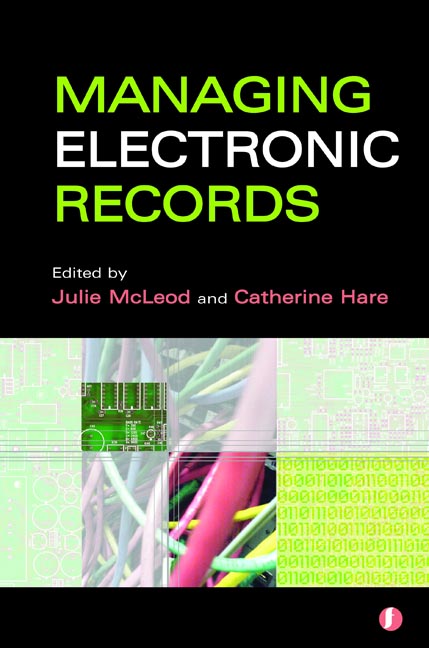Book contents
- Frontmatter
- Contents
- The editors and contributors
- Preface
- 1 The wild frontier ten years on
- 2 The use of standards and models
- 3 Metadata matters
- 4 Digital preservation – ‘the beautiful promise’
- 5 Research in electronic records management
- 6 Technologies for preservation
- 7 Legal issues
- 8 Ethics and electronic recordmaking
- 9 Competencies – the asset that counts most: on developing human talents as a prerequisite for successful EDRM changes
- 10 Records management: two case studies from the French private sector
- 11 Implementing a solution for electronic recordkeeping in the public sector
- 12 Playing the long game – creating and maintaining the links in the value chain
- Index
10 - Records management: two case studies from the French private sector
Published online by Cambridge University Press: 08 June 2018
- Frontmatter
- Contents
- The editors and contributors
- Preface
- 1 The wild frontier ten years on
- 2 The use of standards and models
- 3 Metadata matters
- 4 Digital preservation – ‘the beautiful promise’
- 5 Research in electronic records management
- 6 Technologies for preservation
- 7 Legal issues
- 8 Ethics and electronic recordmaking
- 9 Competencies – the asset that counts most: on developing human talents as a prerequisite for successful EDRM changes
- 10 Records management: two case studies from the French private sector
- 11 Implementing a solution for electronic recordkeeping in the public sector
- 12 Playing the long game – creating and maintaining the links in the value chain
- Index
Summary
Introduction
The two case studies chosen deal with the implementation of records management systems in private sector organizations between 2001 and 2004. This is a long-enough period to allow us to draw lessons from the implementation phases and to analyse the results obtained once the systems were fully working. One case concerns a financial institution with over 2500 employees (in the banking sector) and the other a service company with under 50 employees. In the first case records management is applied in the context of optimizing work flows and business processes. In the second case records management is used in close association with a knowledge management approach. Analysis of both cases shows user satisfaction, risk reduction and cost reduction emerging as positive outcomes.
Case study 1: records management and electronic archiving
The context
As in other European countries where national regulations have evolved in line with European directives, the French Civil Code has incorporated a new definition of the written word. Article 1316 of the Civil Code now reads: ‘Literal proof, or proof through the written word, results from a series of letters, characters, figures or any other signs or symbols that carry intelligible meaning, irrespective of the medium on which they are carried or their mode of transmission.’ Similarly, new definitions of the formats in which evidence can appear are to be found in Article 1316-1 of the Civil Code: ‘The written word in electronic form is accepted as proof in the same way as the written word in paper form, on condition that its author can be duly identified and that it has been created and kept in conditions that guarantee its integrity’ and in Article 1316-3 of the Civil Code: ‘The written word in electronic form enjoys the same force of proof as the written word in paper form.’
The law's technical equivalent had also to be produced to make the law applicable in practice. Thus, the French national standard NF Z 42-013 on ‘recommendations for the design and operation of computer systems with a view to ensuring the preservation and integrity of documents held in such systems’ appeared in its first version in 1999 and in its second version in 2001. It covers time and date stamping, digitization processes, handling of different media and registering of data, security, operating procedures, audit and outsourcing.
- Type
- Chapter
- Information
- Managing Electronic Records , pp. 149 - 162Publisher: FacetPrint publication year: 2005
- 2
- Cited by



